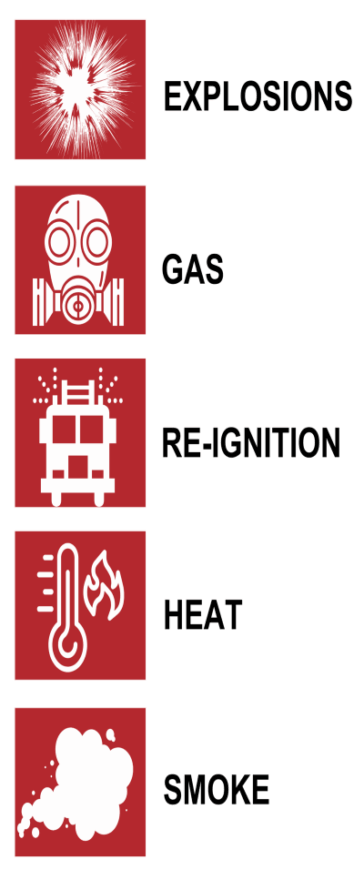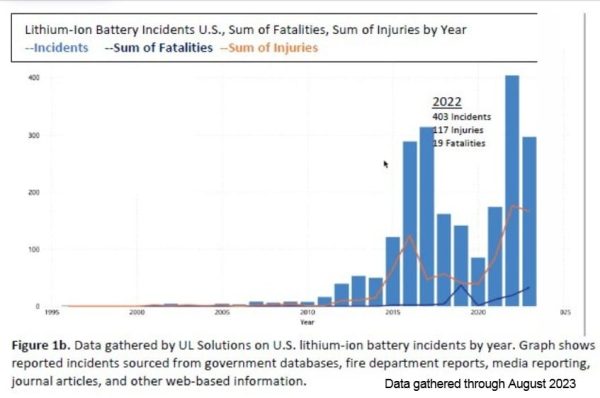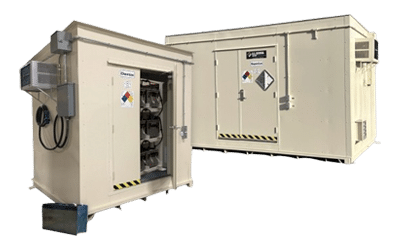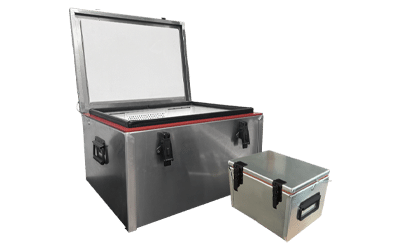Lithium Battery Solutions
U.S. Chemical Storage has been engineering li ion battery storage buildings specifically for the inherent fire hazard risks of lithium-ion batteries for nearly a decade.
Helping the most innovative companies in the world achieve exciting new heights drives us to provide you with the best solutions in safety.
Types of Lithium Battery Solutions We Provide
Lithium Battery Buildings for Safe Solutions
If you rely on lithium batteries as a vital part of your operations, you should be aware of the unique risks they pose. We build structures specifically for those inherent risks to keep your people, products, and the planet safe. View Product >DynaLocLTCs for Lithium Battery Isolation and Transport
When you have a battery that is damaged or showing signs of failure, what do you do? You can utilize this portable solution for a safe way to mitigate your risks instantly. View Product >Lithium Battery Storage - Our Experience in Safety
A leader in hazmat storage structures since 1993, US Chemical Storage has been the gold standard of engineered solutions for those using flammable, combustible, corrosive, explosive,and other hazardous materials.
As the dangers and risks surrounding lithium batteries grew, it was natural for us to begin building hazmat buildings for those risks. For over a decade, we have been engineering safe battery buildings for the protection of your people, property, and planet.
Our engineered building designs for li ion battery storage systems paved the way for NFPA 855 Standard for the Installation of Stationary Energy Storage Systems to include a section for “prefabricated portable structures” for lithium ion battery storage. We are never satisfied with merely meeting code, we want to raise the bar of safety solutions lithium metal or lithium-ion battery storage both inside and outside of your facility.
Add Your Heading Text Here
Know The 5 Risks of Lithium Batteries
Lithium Ion battery fires are different once they go into failure. Many don’t know all the risks they face and are surprised by the power and high speed at which these fires create catastrophic events. Here are the 5 main ways lithium battery fires differ from other combustible fires:

EXPLOSION RISKS
- Violent Explosions
- Increase of Fire Spread Quickly
TOXIC GAS
- Hydrogen Fluoride Gas
- Combustible Gases
RE-IGNITION
Hours or Days After Extinguishing
- Difficult to Extinguish
HIGH TEMPERATURES
Ignite Surrounding Materials Quickly
Make Removal Difficult
HEAVY SMOKE
Eliminates Visibility
Blocks Escape Routes
High Inhalation & Suffocation Risk
Features & Functions
Even before comprehensive codes exist, you must ensure the life and fire safety of your teams, avoid fines, navigate insurance issues, and prevent work stoppages. You must constantly be aware of your facility’s unique material handling needs, flexible requirements, and security issues that your assets require. While you can’t be the expert in every aspect of lithium battery safety, we make it our business to be and with experience serving a wide variety of industries, we are certain we can help you.
Stats & Details

In this graph from Underwriter’s Laboratories, shared in August of 2023, Data shows the exponential growth of lithium-ion batteries in the U.S. from 1995 through nearly 3 decades. While there was a drop in injuries and fatalities during the Covid-19 pandemic, after workplaces were reopened, the injuries and fatalities grew.
Frequently Asked Questions
Lithium-ion batteries are known to spontaneously ignite and pose fire hazards due to overheating from poor battery design, damage to the battery through a drop or strike, electrical shorting, overcharging, rapid discharge, or increased storage temperatures. Li-ion batteries contain lithium metal, which is highly combustible.
- Extremely high temperature fire easily achieving over 1,000° F in minutes
- Violent explosions that can cause injury and quick fire spread
- Toxic gas release full of metals and carcinogens
- Thick black smoke the quickly obstructs vision
- Re-ignition after extinguished hours, days, or even weeks after initial event
While we focus on commercial lithium battery storage concerns, we understand residential batteries are also a concern. Lithium-ion batteries are more stable when held at a steady temperature between ____ and ____. Many garages get too hot or too cold to satisfy that. However, in many cases that is the safest location because it’s not directly attached to the residence surrounded by flammable materials. Overall, keep them as stable as you can in a residential garage environment. Don’t keep batteries on their charging cradles, don’t let the battery sit in direct sunlight, don’t keep it in the tool or appliance, and keep them in a case away from flammable materials.
While codes and regulations are still struggling to catch up to the dangers of lithium-ion batteries, U.S. Chemical Storage has been making hazmat buildings for this purpose for nearly a decade. Several designs of buildings to store or charge lithium batteries are available. Most are 2-hour or 4-hour fire-rated.
Many customers choose between single and multi-room buildings to separate storage from charging stations, assembly rooms, or testing areas. They often have multiple options for fire suppression, and sumps to contain the runoff of heavy metals and toxins.
Li-ion battery storage buildings from U.S. Chemical Storage are custom-engineered to fit your quantity and arrangement needs. We also provide large-scale lithium-ion battery storage for bigger needs.</br?
The National Fire Protection Association (NFPA), the National Fire Code (NFC), and the International Code Council (ICC) have been diligently updating current codes to address safety risks. If you would like to learn about the latest updates relevant to your project, please reach out to a sales engineer. We are here to assist you in navigating any potential risks.
- Power outlets
- Fire suppression systems
- Firehose hookups for fire department water deluge
- LED lights
- Sensors & alarms
- Workbenches (for buildings with charging rooms)
- Temperature & climate controls
- Multi-tiered shelving or cubbies
- Fiberglass flooring
- Rubber matting
- Extra deep sumps
- Chemical resistant paint
Additional options and safety accessories are available. As with any U.S. Chemical Storage product, our lithium-ion battery storage buildings have an industry-leading 15-year structural warranty.
Need a larger than standard footprint? Modular configurations are also available possible for all lithium-ion storage buildings.
Absolutely. We can and we do.
Military bases cannot afford injuries and the loss of mission-critical equipment. Comms, robots, drones, vehicles, and more are utilizing the ease of rechargeable lithium batteries to make missions safer for our troops.
Let us share what we know for the fire and life safety of this increasingly crucial source of power.
Built upon a design created to meet or exceed ATF 27 CFR, Part 555.208 for the temporary storage and transport of high explosives, the DynaLocLTC Safety Case for lithium battery storage and transport has been modified with important features specifically for lithium battery risks.
With little code and regulation guidance for new battery transport and storage as well as proper isolation or transport of DDR or suspected damaged batteries, increased fire protection and suppression measures like those in the DynaLocLTC can protect your people and your property from catastrophic events.
Visit the LTC page for more information.
Request a Quote

YOUR PARTNER IN THE PROCESS. EXPERIENCE YOU CAN TRUST.
We deliver the precise building solution with the speed, security, and high quality that you demand.


